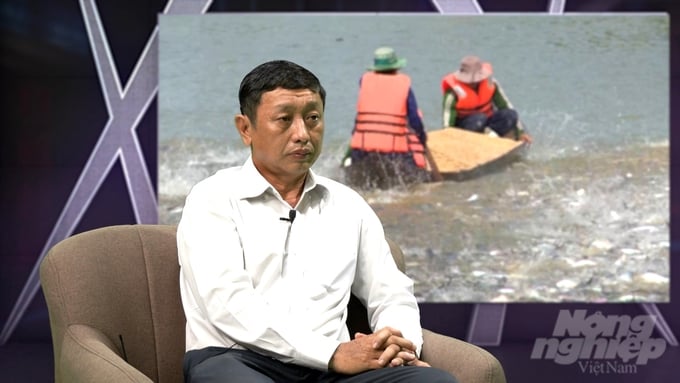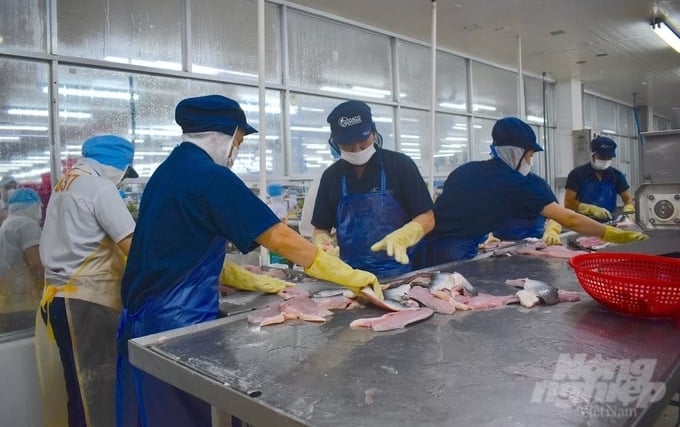May 16, 2025 | 22:56 GMT +7
May 16, 2025 | 22:56 GMT +7
Hotline: 0913.378.918
May 16, 2025 | 22:56 GMT +7
Hotline: 0913.378.918

Mr. Pham Truong Yen, Deputy Director of Can Tho City Department of Agriculture and Rural Development, shared at the seminar "Circular economic development in the pangasius industry chain" conducted by Vietnam Agriculture Newspaper. Photo: Minh Dam.
The breakthrough development of pangasius farming has significantly affected the environmental problems caused by waste from pangasius farming. What is of most concern today is how to handle post-harvest sludge, because if this sludge is pumped directly into the river, there will be a risk of environmental pollution, disease outbreaks, and reduced sustainability of pangasius farming.
The bottom mud of intensive pangasius ponds is mixed with inorganic fertilizer to help rice grow well. The results showed no significant differences in stem height, yield components, number of grains per panicle, and grain weight. Comparing the actual yield, the treatment with a single inorganic fertilizer had the highest and significant yield compared to the two treatments supplemented with organic fertilizer.
However, using organic fertilizer from pangasius pond bottom mud has helped reduce investment costs significantly, and the profit level is acceptable. This is a prospect for the future to continue researching the reuse of this bottom mud, limiting environmental pollution and contributing to developing sustainable pangasius farming.
Mr. Pham Truong Yen, Deputy Director of the Department of Agriculture and Rural Development of Can Tho City, said that the city currently has 207 households and businesses raising pangasius, of which the business pond area accounts for 22%.
Recently, pangasius prices have significantly fluctuated, and most farming households have low profits; from May 2023 until now, many households have fallen into a loss. Therefore, the cost of investing in new technology to treat the environment becomes a big challenge.
The city's agricultural sector has monitored the environment to support farming households. In particular, by 2022, the industry will invest in an automatic monitoring system to promptly notify changes in water quality.
In addition, the city Department of Agriculture and Rural Development also coordinates with other units such as the environmental monitoring station of the Southern Aquatic Environmental Monitoring Center - Research Institute for Aquaculture No2; Center for Testing, Testing, and Verification of Aquaculture (Ministry of Agriculture and Rural Development), which share information about water source quality and promptly notifies pangasius farming households.
Information about the city's orientation to exploit waste sources in aquaculture: Mr. Pham Truong Yen said, in Can Tho City, wastewater is treated by passing through settling ponds, evaporated to make fertilizer for plants, or processed for other purposes.

Pangasius processing activities for export. Photo: Minh Dam.
The Agriculture and Rural Development sector also coordinates with scientists to research wastewater sludge treatment. In wastewater sludge treatment, the most challenging problem is the concentration problem because wastewater sludge contains both sludge and water and the nutrient content is unevenly distributed in different layers. To standardize wastewater sludge to become a source of fertilizer for plants requires undergoing industrial treatment. In addition to coordinating with domestic institutes and schools, the Agriculture and Rural Development sector coordinates with foreign organizations to find solutions. In addition, some businesses are raising the issue of collecting waste sludge to produce fertilizer.
After Can Tho City's integrated planning was approved, the industry prioritized directions and solutions, especially the concentrated pangasius seed production area, which invested in technology and scientific advances in the fish farming process, continuing to strengthen propaganda to help farming households understand methods and solutions to reduce greenhouse gas emissions.
In addition, the Department of Agriculture and Rural Development has signed a cooperation agreement with Can Tho University to resolve difficulties arising in the production process, including pangasius. In addition to improving the quality of finished products for export, pangasius production needs to ensure environmental issues, disease safety and social responsibility to enhance the competitive position of pangasius products and prestige more advantageous consumption.
In the coming time, the Agriculture and Rural Development sector of Can Tho City will continue to carry out foreign cooperation, such as: the Association of Dutch Water Companies on water resource management, long-term, effective, sustainable and adaptive use of water resources. In another direction, the industry coordinates with Hiroshima province (Japan) in wastewater sludge treatment, using biochar to put into agriculture to reduce greenhouse gas emissions.
Regarding the direction of agricultural production in the coming time, the Agriculture and Rural Development sector of Can Tho City has determined to produce organically and circular agriculture so that by-products become inputs for other industries to add higher value.
In addition, Mr. Pham Truong Yen also added that the pangasius industry is currently facing difficulties in capital, including businesses. A possible solution is public-private cooperation to solve this global problem jointly.
Translated by Tuan Huy

(VAN) Cold-barn systems efficiently manage environmental and temperature conditions, which aids in the prevention of respiratory diseases in pigs and protects them from the vectors that transmit African swine fevers.

(VAN) To tackle challenges, the project 'Addressing key technical bottlenecks in the grouper supply chain in Vietnam' has been underway since 2024.

(VAN) The project 'Disease-Resilient and Sustainable Cassava Production Systems in the Mekong Region', funded by the Australian Center for International Agricultural Research (ACIAR), is being implemented from 2024 to 2028.

(VAN) Data from 10,000 farming households will help professionalize production organization and support the implementation of the One Million Hectares Program for High-Quality, Low-Emission Rice Cultivation.

(VAN) FAO Director-General QU Dongyu marks International Day of Plant Health at NENA conference.

(VAN) Deputy Minister of Agriculture and Environment Hoang Trung affirmed that floriculture and ornamental plants are a growing industry that receives significant global attention.

(VAN) The three staple crops dominating modern diets – corn, rice and wheat – are familiar to Americans. However, fourth place is held by a dark horse: cassava.